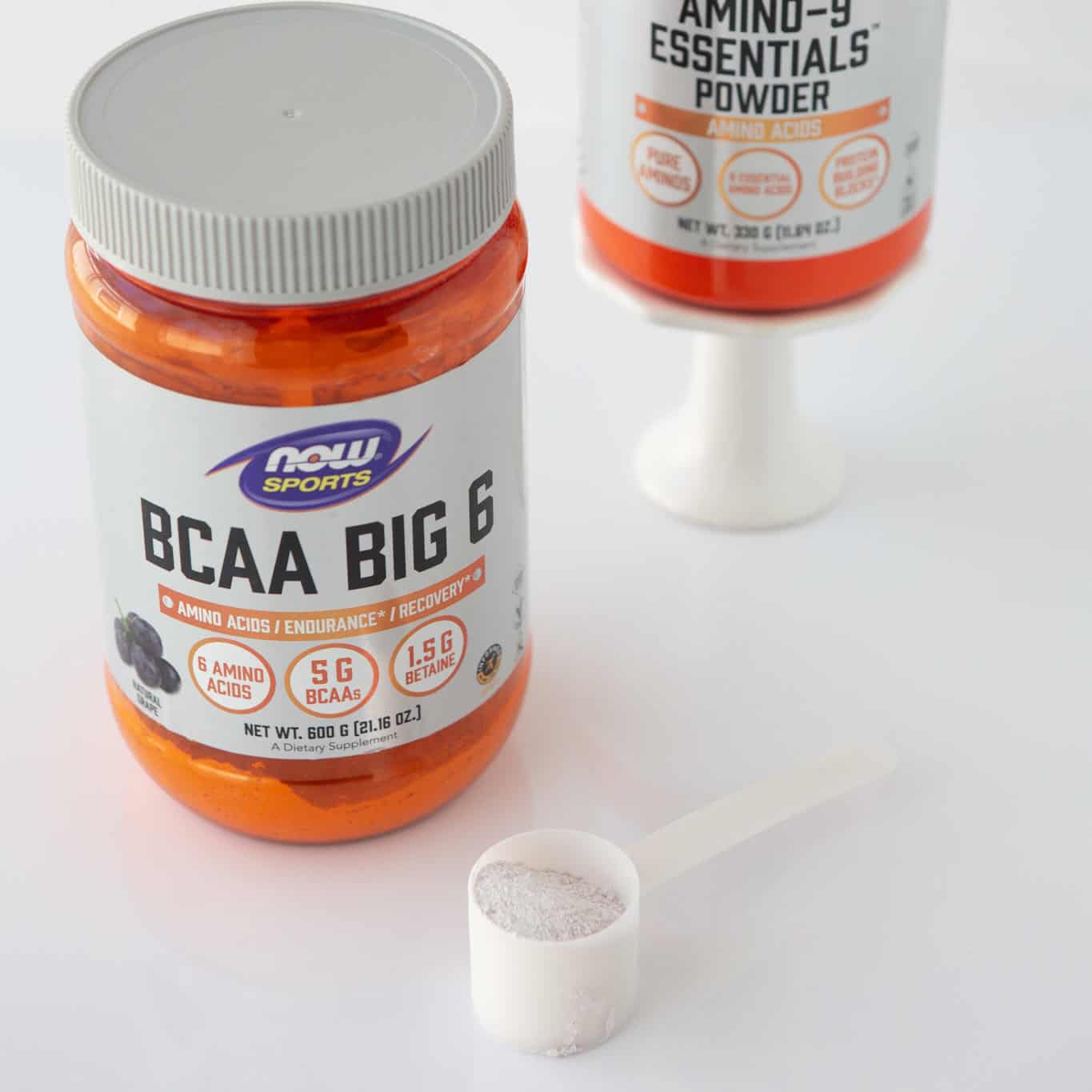
Branched-chain amino acids, or BCAAs, have gained popularity in recent years as a supplement for athletes. They promise improvements in muscle growth and repair, reduced muscle soreness, decreased exercise fatigue, improved exercise performance, and muscle preservation. Let's take a closer look at BCAAs to better determine if they might be helpful for you.

What are Amino Acids?
Amino acids have been coined as the building blocks of protein. You have probably heard about protein, since it is one of the macronutrients we consume in our food every day. Or maybe you take protein powder or protein shakes to help supplement your diet. Either way, the protein found in our food and these protein supplements are all made out of amino acids.
Think about it like this: amino acids are like individual chains that link together to form a chain of protein.
Protein found from animal sources such as meat/poultry, dairy, eggs, and fish, and protein found in quinoa and soy products such as tofu, are considered complete proteins. This means they contain all 9 essential amino acids that our body must obtain from food to function. Other plant-based foods also contain protein, but they are incomplete, since not all 9 amino acids are present.
The 9 essential amino acids are: histidine, methionine, phenylalanine, threonine, tryptophan, lysine, and the branch chain amino acids - isoleucine, leucine, and valine.
Different plant foods such as vegetables, grains, nuts/seeds, and legumes contain different mixes of amino acids. Therefore, consuming a variety of different plant foods can still provide all the amino acids your body needs.
Protein is important for muscle growth and tissue repair. It's also important in bone health, skin health, immune system function, satiety and appetite control, and our metabolic health. As you can tell, protein is important for a variety of reasons. In particular, amino acids serve a particular purpose in performance, athletics and perhaps even body composition, which we will explore in this post.
Amino Acids in Athletes
Amino acids and protein serve an important role in the training and recovery process after athletic performance. This is true for professional athletes and those who simply enjoy physical fitness in their free time.
After exercise, there is a breakdown of muscle protein due to the stress put on them by the activity. Ultimately, this process then leads to muscle remodeling which strengthens the muscles stronger than they were before.
Consuming adequate protein for your training intensity is important in supporting the muscle repair process. Now that we know about the role of protein, what about BCAAs specifically?
What are Branched Chain Amino Acids?

Branched chain amino acids refer to 3 different amino acids that are similar in structure, hence the term “branched”. These include leucine, isoleucine, and valine, which are all three considered essential, because our body cannot make them.
So, what makes these amino acids so special? Because of their structure, these amino acids have been found to be metabolized most predominantly in the skeletal muscle. This has prompted additional research to explore potential benefits BCAAs have on the muscles, particularly in the context of sports and training.1
Building Muscle
BCAAs have shown to play a role in stimulating muscle protein synthesis, particularly the amino acid Leucine.2,3 Muscle protein synthesis is the term used to describe the process of our muscles rebuilding in response to a training session. Research has demonstrated leucine’s ability to activate mTORC1, a key protein involved in the stimulation of muscle protein synthesis. 2,3
Although BCAA supplementation can stimulate muscle growth, BCAAs alone cannot support muscle growth in the absence of high-quality complete protein.2,3 We know that BCAAs stimulate muscle protein synthesis after a meal for up to 2 hours, but consuming BCAAs with a complete protein source is going to sustain the process for up to 24 hours.
It's still important, therefore, to consume sources of complete protein (containing all essential amino acids) after exercise to build our muscles. This could be through food sources or a complete protein supplement such as whey protein.
Does this mean you should mix BCAA with a protein supplement for more muscle gain? The answer is yes and no.
Right now, according to the research, consuming adequate amounts of protein results in greater and more sustained muscle protein synthesis than BCAA. Also, adding BCAA in addition to protein does not offer additional muscle building effects.2,3 But this doesn’t mean BCAAs don’t offer other benefits.
Leucine Threshold
Another factor to consider in post exercise/training protein is the amount of leucine it contains. The leucine trigger hypothesis states that a threshold dose of 2-3 g of leucine specifically is ideal for maximizing muscle protein synthesis (MPS).
In a recent review of the literature, it seems that this is more important for older adults who can become more resistant to MPS.13
In my practice, supplementing post-workout with BCAA including leucine has been a helpful tactic for women who are on a calorie controlled diet and also want to maximize the potential for muscle building.
Muscle Soreness
BCAAs have gained attention for their potential ability to reduce muscle soreness after a training session. After you train, it is common to experience delayed onset muscle soreness, also known as DOMS.
DOMS is the body’s response to the normal microtears that occur in the muscle. Research shows that BCAAs may reduce muscle soreness in resistance trained athletes. The effects in endurance trained athletes are unclear.4,5
This may be due to BCAAs ability to reduce creatine kinase (CK) levels in the blood after training, which is an indicator of the extent of exercise-induced muscle damage.4,5 This means that BCAA supplementation in addition to adequate protein intake can facilitate a quicker recovery time in resistance trained athletes.

Muscle fatigue
So we know BCAAs can result in less muscle soreness, but can this supplement help improve your exercise performance?
Research shows BCAAs can increase exercise performance by decreasing muscle fatigue during the activity. This effect was found in endurance athletes.6 The proposed reason for this effect is BCAA’s ability to lower serotonin levels in the blood.6
Serotonin is produced and dopamine decreases as physical activity proceeds. As a result, this causes an increased perception of fatigue.7 Therefore, BCAA supplementation before physical activity can help reduce your brain’s perception of fatigue, allowing you to train harder and perform better.
Timing of BCAA Supplementation
The range for dosing BCAA supplementation is anywhere between 2–20 g/day. Working with a Registered Dietitian Nutrition who specializes in sports nutrition is the BEST way to know if BCAA are right for you and what dosage to try out. Just because a supplement has a certain dosage on their supplement label DOES NOT mean that is the right amount for you personally to take.8
There is limited research investigating the best time to take BCAA to experience its variety of benefits. One study found that supplementing with BCAA before exercise had a more significant effect in reducing DOMS, or delayed-onset muscle soreness, and exercise-induced muscle damage following resistance training compared to BCAA supplementation after exercise.9
Although BCAA levels peak in your blood 30 minutes after supplementation, we don't have enough research to determine the exact timing to maximize its benefits.10
Side Effects
There is no evidence of serious side effects resulting from BCAA supplementation in healthy individuals when taken at the recommended dosage. It is not recommended for women who are pregnant or breastfeeding, and you should always consult with a physician before starting or stopping a new supplement.
Recommended Products
It is very important to choose quality products from companies that implement high standards for manufacturing. If you are an athlete, it is also important to select supplements with a third party certification that ensures purity.
Here is a list of some of my favorite BCAA supplements that can be found in my Fullscript dispensary, my trusted source for purchasing and recommending supplements. (affiliate link)
Final Thoughts
There are many benefits of BCAAs. If your physical activity consists of resistance exercises, taking a BCAA supplement before or after a training session may help reduce muscle soreness.
To maximize muscle growth and increase resting energy expenditure after training, the Journal of the International Society of Sports Nutrition recommends consuming carbohydrates and 20-40 grams of protein within 30 minutes to 2 hours after resistance training.11 This should be a source of protein that includes leucine and all the branch chain amino acids.
Fuel your workout with a small snack or meal containing carbohydrates and protein prior to the resistance training as well.11
If you are an endurance athlete, taking a BCAA supplement before or after training may help reduce fatigue during exercise. This could help to improve performance. Consuming protein and carbohydrates before and after training is also important to prevent muscle breakdown following exercise.
Daily ACSM protein recommendation for athletes: 1.2-2.0 g protein / kg body weight12
References
1. Mann G, Mora S, Madu G, Adegoke OAJ. Branched-chain Amino Acids: Catabolism in Skeletal Muscle and Implications for Muscle and Whole-body Metabolism. Front Physiol. 2021;12:702826. Published 2021 Jul 20. doi:10.3389/fphys.2021.702826
2. Santos C de S, Nascimento FEL. Isolated branched-chain amino acid intake and muscle protein synthesis in humans: a biochemical review. Einstein. 2019;17(3):eRB4898--. doi:10.31744/einstein_journal/2019rb4898
3. Jackman SR, Witard OC, Philp A, Wallis GA, Baar K, Tipton KD. Branched-Chain Amino Acid Ingestion Stimulates Muscle Myofibrillar Protein Synthesis following Resistance Exercise in Humans. Frontiers in physiology. 2017;8:390-390. doi:10.3389/fphys.2017.00390
4. Martinho D. Oral Branched-Chain Amino Acids Supplementation in Athletes: A Systematic Review. Nutrients. 2022;14(19).
5. Dorrell, Harry; Gee, Thomas (2015). The acute effects different quantities of branched-chain amino acids have on recovery of muscle function. University of Lincoln. Conference contribution. https://hdl.handle.net/10779/lincoln.25168151.v2
6. AbuMoh'd MF, Matalqah L, Al-Abdulla Z. Effects of Oral Branched-Chain Amino Acids (BCAAs) Intake on Muscular and Central Fatigue During an Incremental Exercise. J Hum Kinet. 2020;72:69-78. Published 2020 Mar 31. doi:10.2478/hukin-2019-0099
7. Cordeiro LMS, Rabelo PCR, Moraes MM, et al. Physical exercise-induced fatigue: the role of serotonergic and dopaminergic systems. Brazilian journal of medical and biological research. 2017;50(12):e6432-e6432. doi:10.1590/1414-431X20176432
References Continued
8. Holeček M. Side effects of amino acid supplements. Physiol Res. 2022;71(1):29-45. doi:10.33549/physiolres.934790
9. Ra SG, Miyazaki T, Kojima R, et al. Effect of BCAA supplement timing on exercise-induced muscle soreness and damage: a pilot placebo-controlled double-blind study. J Sports Med Phys Fitness. 2018;58(11):1582-1591. doi:10.23736/S0022-4707.17.07638-1
10. Howatson G, Hoad M, Goodall S, Tallent J, Bell PG, French DN. Exercise-induced muscle damage is reduced in resistance-trained males by branched chain amino acids: a
11. Kerksick CM, Arent S, Schoenfeld BJ, et al. International Society of Sports Nutrition Position Stand: Nutrient Timing. Journal of the International Society of Sports Nutrition. 2017;14(1). doi:10.1186/s12970-017-0189-4 randomized, double-blind, placebo controlled study. J Int Soc Sports Nutr. 2012;9:20. Published 2012 Jul 12. doi:10.1186/1550-2783-9-20
12. Jäger R, Kerksick CM, Campbell BI, et al. International Society of Sports Nutrition Position Stand: protein and exercise. J Int Soc Sports Nutr. 2017;14:20. Published 2017 Jun 20. doi:10.1186/s12970-017-0177-8
13. Zaromskyte G, Prokopidis K, Ioannidis T, Tipton KD, Witard OC. Evaluating the Leucine Trigger Hypothesis to Explain the Post-prandial Regulation of Muscle Protein Synthesis in Young and Older Adults: A Systematic Review. Front Nutr. 2021 Jul 8;8:685165. doi: 10.3389/fnut.2021.685165. PMID: 34307436; PMCID: PMC8295465.


















